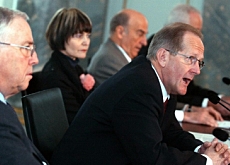
Support for EU accords put to the test

Swiss voters will decide on June 5 whether Switzerland signs up to the European Union Schengen/Dublin accords on closer security and asylum cooperation.
The government is calling for a yes vote while opposition is led by the rightwing Swiss People’s Party, which collected more than the 50,000 signatures needed to force a referendum on the issue.
Tests of public opinion have shown majority support for the treaties but indicate that support has ebbed over the past few weeks. With just a month to go before the vote, both sides are making their cases with renewed force.
Two weeks ago the government held a news conference to officially launch its campaign in favour of the accords. No fewer than four of the seven cabinet ministers were present, “a sign of our conviction as a government and our unity”, according to Economics Minister Joseph Deiss.
Speaking at the media event, the ministers argued that membership of Schengen/Dublin would improve Switzerland’s security, help resolve asylum problems and bring many economic benefits.
The case for
The Schengen agreements permit free movement between EU member states by doing away with systematic checks on individuals at internal frontiers. The Treaty of Dublin, for its part, regulates asylum issues between the EU states and streamlines the asylum process.
The government believes it is vital that Switzerland participates in Schengen. It points out that bilateral police and customs cooperation agreements between Switzerland and its neighbours have not proved sufficient to combat modern forms of crime and that broader cooperation is called for.
In particular it argues that Switzerland needs access to EU data stored on the state-of-the-art SIS computer network system. It warns that “in the event of a ‘go-it-alone’ policy, Switzerland risks becoming a weak point in European security”.
Schengen membership would make the country’s borders more rather than less secure, the government argues. Swiss border guards would continue to carry out checks on individuals and goods. But instead of all checks taking place at the border, under Schengen checks could be carried out at different locations in the border zone.
Another feature of Schengen is the visa policy allowing tourists to travel throughout Europe without restriction. The authorities say Switzerland’s inclusion in this scheme could be a real boon to tourism.
The government also sees advantages for Switzerland through signing the Dublin Treaty.
The Dublin measures against multiple asylum applications in different countries should make Switzerland less attractive to asylum seekers in relation to other countries, it believes. The right to one asylum hearing in the whole of Europe should also prevent what is referred to as “asylum tourism”.
The case against
Present at the launch of the government’s campaign was Justice Minister Christoph Blocher, whose rightwing Swiss People’s Party is bitterly opposed to Schengen/Dublin.
Hinting at his own lack of conviction, Blocher said the security and asylum situation in Switzerland would improve “if the system works”.
But Blocher’s party colleagues are convinced that a yes vote on June 5 would compromise Switzerland’s security and lead to soaring crime.
Party president Ueli Maurer went as far as to say that Schengen was “the biggest threat” to the country’s sovereignty and security since the founding of the modern state in 1848.
A new advertising poster features cartoon images of men and women holding their hands up in horror at the thought of Schengen membership. “Security lost, jobs lost? No to Schengen!” reads the slogan.
“If Switzerland says yes to Schengen/Dublin that will mean the most attractive country in Europe doing away with border controls and opening its doors wide,” the party says on its website.
“The result would be a grave loss of security entailing more criminal tourism, more illegal immigrants, more illegal workers and more unemployment.”
swissinfo with agencies
Switzerland ratified a first set of bilateral accords with the EU on October 16, 2000.
Parliament approved a second set of bilaterals in December, 2004.
These included agreement on Swiss membership of the Schengen/Dublin treaties.
The People’s Party launched a challenge to the Schengen/Dublin accords.
A nationwide referendum is to be held on June 5.

In compliance with the JTI standards
More: SWI swissinfo.ch certified by the Journalism Trust Initiative




























You can find an overview of ongoing debates with our journalists here . Please join us!
If you want to start a conversation about a topic raised in this article or want to report factual errors, email us at english@swissinfo.ch.